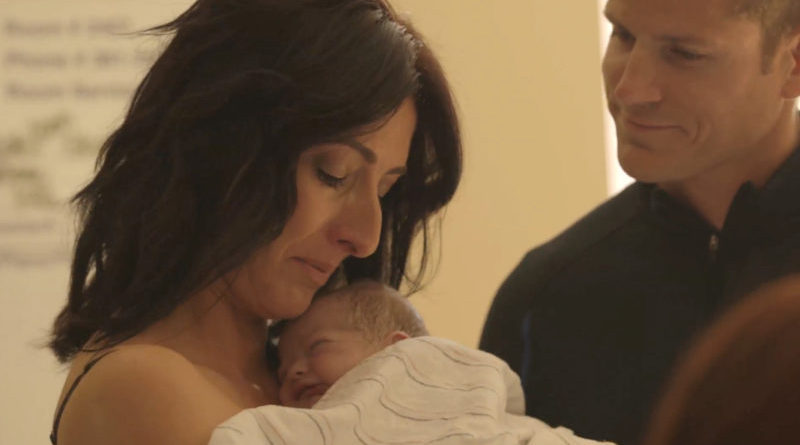INTERVIEW: Surrogacy explored in new Boise-set documentary
Photo: Shannon and husband Tom hold their baby for the first time after surrogate Nicole (not pictured) gives birth. Photo courtesy of Jenni Morello / Provided by PBS with permission.
The community of Boise, Idaho, has developed a reputation for being the surrogacy capital of the United States, and filmmaker Beth Aala is fascinated by these women who are choosing to become paid surrogates for families around the world. She decided to focus in on four women from this community for her new documentary, Made in Boise, part of the Independent Lens series and now streaming on PBS.
Aala’s friend “was going through some fertility issues, and after many years of trying to have a baby on her own and going through [in vitro fertilization] … she actually asked me to be her surrogate,” the director said in a recent phone interview. “Because I saw what she was going through, I said yes, even though I really didn’t want to be pregnant again.”
A month after she finalized that decision, Aala’s friend actually became pregnant, but the thought of being a surrogate stayed with the film director, so much so that she decided to explore the idea of making a documentary film on the subject.
“It really gave me this lens to this topic that allowed me to be open to the idea of making a film,” said Aala, whose other films include Rancher, Farmer, Fisherman and Supermensch: The Legend of Shep Gordon. “And so leading into that, my childhood best friend, another dear friend of mine, actually works at St. Luke’s [Medical Center], which is a local hospital in Boise.”
That’s when Aala found out about the high number of women who are surrogates in Boise. Once the filmmaker heard that news, she immediately wanted to find out more. When she started to explore, sure enough she found that surrogacy in the Idaho city was happening and blossoming, thanks to a number of unique factors.
“I guess because my friend had asked me to carry, I really wanted to explore the idea of why a woman would choose to do this for someone else,” Aala said. “Once I committed to doing this film, I wanted it to be from the perspective of the surrogates, and, of course, you have to have a little context of why this is relevant. But I really wanted it to be a character-driven film, and so my very first trip out to St. Luke’s they had suggested I meet Nicole … who is one of the characters in the film.”
Aala, quite boldly, brought a camera on her visit with Nicole, and by the time she was done talking, the record button was clicked on. Nicole was fine with the questions and fine with being filmed.
“I asked her if I could start filming right away because she was so open and generous, and I was really intrigued by the whole setting,” the filmmaker said. “It was really normalized when I went out there. That was what was so fascinating. No one blinked at this thing that I thought was really unusual. All of these concentrated folks were in this community, and Nicole was doing this thing and helping families in this way that was really eye-opening. And so she allowed me to film that very first day, and she also introduced me to the other women in the film because they all work with her agency. So pretty early on I knew I wanted it to be from their perspective, but it took a little while to find everybody, but it was with the help of Nicole.”
Aala, who has won three Emmy Awards, loved the concept of a community of women trying to figure out this complex issue together. They found a home at St. Luke’s, which is “one of only two adoption/surrogacy programs in the nation,” according to its official website.
“They just saw a surge in surrogacy that was coming through their institution, and they were looking at each other, like, we have to do something about this because we’re not caring for these families in the way that we could be,” the filmmaker learned. “And so you have these amazing women, these nurses at St. Luke’s that were like, let’s figure this out.”
She added: “They were these strong, very forward-thinking women who were trying to figure this out. It sort of surfaced without all them really pursuing this. They were kind of reacting to what was happening in the town.”
By John Soltes / Publisher / John@HollywoodSoapbox.com
Made in Boise, directed by Beth Aala, is now streaming on PBS. Click here for more information.

